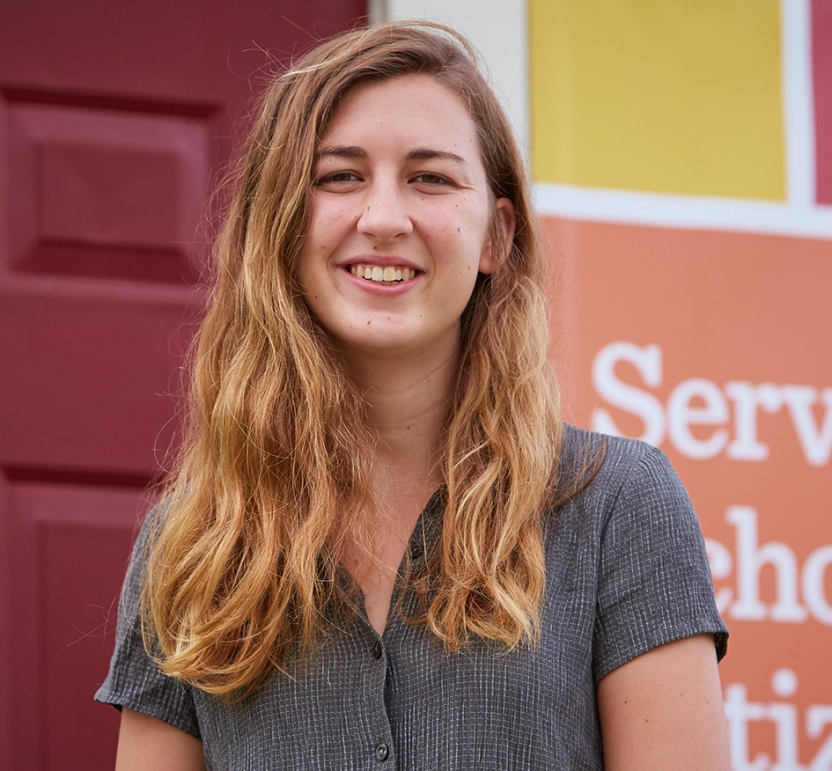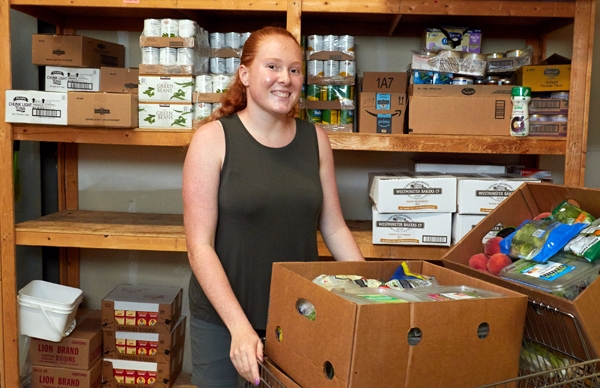Privilege & Poverty Interns Grapple with Big Questions as They Pitch in on Day-to-Day Operations

MIDDLEBURY, Vt. – For senior Grace Levin, a key moment in her summer internship at a homeless shelter came from making vanilla cupcakes with pink frosting.
A sociology major, Levin has studied and analyzed poverty issues repeatedly in the classroom. Hailing from Los Angeles, she’s well acquainted with the face of urban homelessness. But working at the John Graham Shelter in nearby Vergennes has given her yet another lens on poverty in America.
“At the shelter, you get to know people really well. They’re not just faces in the crowd or ‘numbers’ or ‘populations,’” said Levin. “People’s stories get to hold their own.”
Levin’s job has put her at the heart of the shelter’s day-to-day life and day-to-day operations. She’s pitched in on household chores (as do all staff), gardened, read to kids while a parent cooked dinner, helped residents fill out forms and access services, processed gas vouchers, picked up donations, attended weekly meetings with local partner organizations—and just hung out and listened.
Levin used many of these “hanging out” moments to tackle the mountain of zucchini donated by local farmers, baking breads and muffins. One resident in particular was often on hand.
“So one day I asked her if she wanted to help me make the zucchini bread, and a few days later she was like, ‘I have this cupcake mix. Do you want to make some cupcakes?’”

Hannah Kredich ’20 is working as a privilege and poverty intern this summer at HOPE (Helping Overcome Poverty’s Effects), which includes the primary food shelf in Middlebury.
As they worked together, the woman started telling Levin more of her story. In one of those conversations, said Levin, “I was asking her how her day was and she said she had been to this restaurant and picked up a job application and was trying to fill it out but she felt like she didn’t have enough to say and could I maybe help her.”
Together they tackled the job application; then together they sat at the shelter computer and pounded out a résumé. The woman is now seeking vocational counseling as a next step to set goals and get training.
“At first I was sort of wondering, ‘Am I being supportive here or am I just baking cupcakes? And is that really using her time and my time well?’” said Levin. “But I realized that building trust and building that relationship are really important. She was able to feel comfortable coming to me and asking for what she knew she needed.”
Levin is one of 14 Middlebury students placed locally and nationwide this summer as part of Middlebury’s Privilege & Poverty program, an “academic cluster” that brings together faculty, students, and staff interested in studying economic inequality. The program is jointly directed by Center for Community Engagement Director Tiffany Nourse Sargent ’79 and Professor of Religion James Calvin Davis. Seven students work in Addison County at such organizations as John Graham Housing and Services, HOPE (Helping Overcome Poverty’s Effects), the Open Door Clinic, and WomenSafe. Seven work nationwide in cities like Atlanta and Baltimore—engaged in refugee resettlement, community development, healthy food access in low-income communities, and providing fair access to the justice system.
When students begin connecting their educations to their role as citizens solving social problems, “for me that’s the ballgame,” said Davis.
“It’s a humanistic approach to a social problem that gives us some of our key capacities that will be necessary if we’re going to make any progress at all on it: empathy, listening, critical thinking, intercultural competence. These are precisely the skills we need to grapple with our world’s most intractable problems.”
By Gaen Murphree; Photos by Todd Balfour

